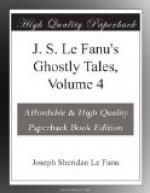“Keep it to yourself, whatever it is, for there is neither grace nor luck about you,” cried Bob Martin, freezing with terror; “leave me alone, will you.”
And he fumbled in vain among the seething confusion of his ideas for a prayer or an exorcism. He quickened his pace almost to a run; he was now close to his own door, under the impending bank by the river side.
“Let me in, let me in, for God’s sake; Molly, open the door,” he cried, as he ran to the threshold, and leant his back against the plank. His pursuer confronted him upon the road; the pipe was no longer in his mouth, but the dusky red glow still lingered round him. He uttered some inarticulate cavernous sounds, which were wolfish and indescribable, while he seemed employed in pouring out a glass from the bottle.
The sexton kicked with all his force against the door, and cried at the same time with a despairing voice.
“In the name of God Almighty, once for all, leave me alone.”
His pursuer furiously flung the contents of the bottle at Bob Martin; but instead of fluid it issued out in a stream of flame, which expanded and whirled round them, and for a moment they were both enveloped in a faint blaze; at the same instant a sudden gust whisked off the stranger’s hat, and the sexton beheld that his skull was roofless. For an instant he beheld the gaping aperture, black and shattered, and then he fell senseless into his own doorway, which his affrighted wife had just unbarred.
I need hardly give my reader the key to this most intelligible and authentic narrative. The traveller was acknowledged by all to have been the spectre of the suicide, called up by the Evil One to tempt the convivial sexton into a violation of his promise, sealed, as it was, by an imprecation. Had he succeeded, no doubt the dusky steed, which Bob had seen saddled in attendance, was destined to have carried back a double burden to the place from whence he came.
As an attestation of the reality of this visitation, the old thorn tree which overhung the doorway was found in the morning to have been blasted with the infernal fires which had issued from the bottle, just as if a thunder-bolt had scorched it.
The moral of the above tale is upon the surface, apparent, and, so to speak, self-acting—a circumstance which happily obviates the necessity of our discussing it together. Taking our leave, therefore, of honest Bob Martin, who now sleeps soundly in the same solemn dormitory where, in his day, he made so many beds for others, I come to a legend of the Royal Irish Artillery, whose headquarters were for so long a time in the town of Chapelizod. I don’t mean to say that I cannot tell a great many more stories, equally authentic and marvellous, touching this old town; but as I may possibly have to perform a like office for other localities, and as Anthony Poplar is known, like Atropos, to carry a shears, wherewith to snip across all “yarns” which exceed reasonable bounds, I consider it, on the whole, safer to despatch the traditions of Chapelizod with one tale more.




